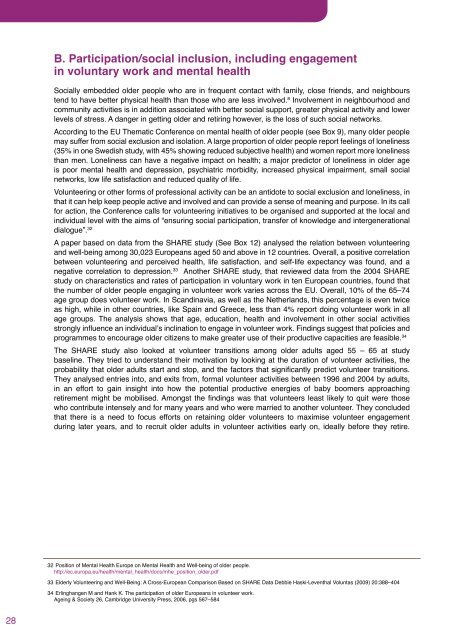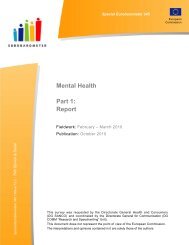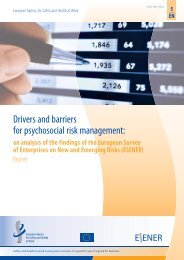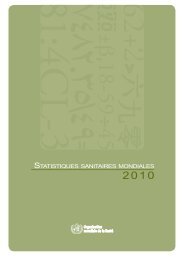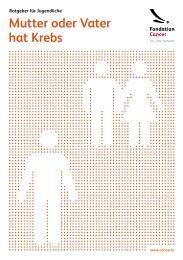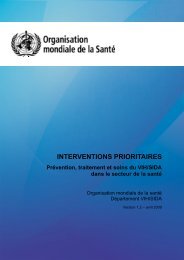healthy and active ageing - EuroHealthNet's Healthy Ageing Website
healthy and active ageing - EuroHealthNet's Healthy Ageing Website
healthy and active ageing - EuroHealthNet's Healthy Ageing Website
Create successful ePaper yourself
Turn your PDF publications into a flip-book with our unique Google optimized e-Paper software.
B. Participation/social inclusion, including engagement<br />
in voluntary work <strong>and</strong> mental health<br />
Socially embedded older people who are in frequent contact with family, close friends, <strong>and</strong> neighbours<br />
tend to have better physical health than those who are less involved. 8 Involvement in neighbourhood <strong>and</strong><br />
community activities is in addition associated with better social support, greater physical activity <strong>and</strong> lower<br />
levels of stress. A danger in getting older <strong>and</strong> retiring however, is the loss of such social networks.<br />
According to the EU Thematic Conference on mental health of older people (see Box 9), many older people<br />
may suffer from social exclusion <strong>and</strong> isolation. A large proportion of older people report feelings of loneliness<br />
(35% in one Swedish study, with 45% showing reduced subjective health) <strong>and</strong> women report more loneliness<br />
than men. Loneliness can have a negative impact on health; a major predictor of loneliness in older age<br />
is poor mental health <strong>and</strong> depression, psychiatric morbidity, increased physical impairment, small social<br />
networks, low life satisfaction <strong>and</strong> reduced quality of life.<br />
Volunteering or other forms of professional activity can be an antidote to social exclusion <strong>and</strong> loneliness, in<br />
that it can help keep people <strong>active</strong> <strong>and</strong> involved <strong>and</strong> can provide a sense of meaning <strong>and</strong> purpose. In its call<br />
for action, the Conference calls for volunteering initiatives to be organised <strong>and</strong> supported at the local <strong>and</strong><br />
individual level with the aims of “ensuring social participation, transfer of knowledge <strong>and</strong> intergenerational<br />
dialogue”. 32<br />
A paper based on data from the SHARE study (See Box 12) analysed the relation between volunteering<br />
<strong>and</strong> well-being among 30,023 Europeans aged 50 <strong>and</strong> above in 12 countries. Overall, a positive correlation<br />
between volunteering <strong>and</strong> perceived health, life satisfaction, <strong>and</strong> self-life expectancy was found, <strong>and</strong> a<br />
negative correlation to depression. 33 Another SHARE study, that reviewed data from the 2004 SHARE<br />
study on characteristics <strong>and</strong> rates of participation in voluntary work in ten European countries, found that<br />
the number of older people engaging in volunteer work varies across the EU. Overall, 10% of the 65–74<br />
age group does volunteer work. In Sc<strong>and</strong>inavia, as well as the Netherl<strong>and</strong>s, this percentage is even twice<br />
as high, while in other countries, like Spain <strong>and</strong> Greece, less than 4% report doing volunteer work in all<br />
age groups. The analysis shows that age, education, health <strong>and</strong> involvement in other social activities<br />
strongly influence an individual’s inclination to engage in volunteer work. Findings suggest that policies <strong>and</strong><br />
programmes to encourage older citizens to make greater use of their productive capacities are feasible. 34<br />
The SHARE study also looked at volunteer transitions among older adults aged 55 – 65 at study<br />
baseline. They tried to underst<strong>and</strong> their motivation by looking at the duration of volunteer activities, the<br />
probability that older adults start <strong>and</strong> stop, <strong>and</strong> the factors that significantly predict volunteer transitions.<br />
They analysed entries into, <strong>and</strong> exits from, formal volunteer activities between 1996 <strong>and</strong> 2004 by adults,<br />
in an effort to gain insight into how the potential productive energies of baby boomers approaching<br />
retirement might be mobilised. Amongst the findings was that volunteers least likely to quit were those<br />
who contribute intensely <strong>and</strong> for many years <strong>and</strong> who were married to another volunteer. They concluded<br />
that there is a need to focus efforts on retaining older volunteers to maximise volunteer engagement<br />
during later years, <strong>and</strong> to recruit older adults in volunteer activities early on, ideally before they retire.<br />
32 Position of Mental Health Europe on Mental Health <strong>and</strong> Well-being of older people.<br />
http://ec.europa.eu/health/mental_health/docs/mhe_position_older.pdf<br />
33 Elderly Volunteering <strong>and</strong> Well-Being: A Cross-European Comparison Based on SHARE Data Debbie Haski-Leventhal Voluntas (2009) 20:388–404<br />
34 Erlinghangen M <strong>and</strong> Hank K. The participation of older Europeans in volunteer work.<br />
<strong>Ageing</strong> & Society 26, Cambridge University Press, 2006, pgs 567–584<br />
28


